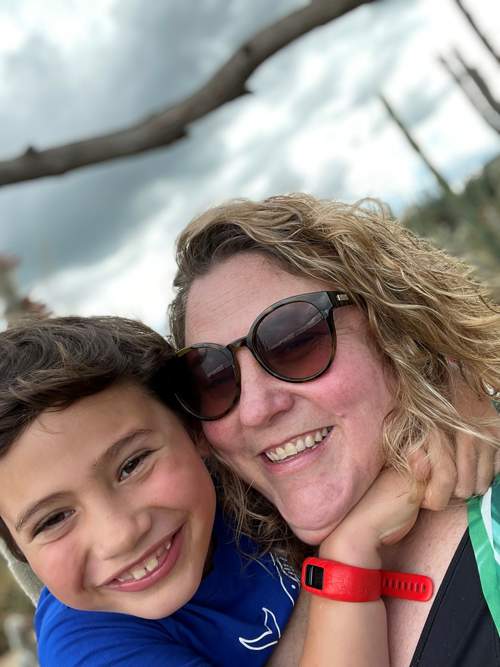 If the coronavirus (COVID-19) pandemic has taught Kristy Bourke anything, it’s accepting that you can’t do it all.
If the coronavirus (COVID-19) pandemic has taught Kristy Bourke anything, it’s accepting that you can’t do it all.
Especially when you’re a single mother raising a six-year-old son, working fulltime at Goulburn-Murray Water (GMW) and studying a Masters of Business Administration.
All from home.
Kristy is no different to many others trying to juggle family, work and life during one of the most challenging periods in our history, and she shares her story of “surviving the chaos” as part of Mental Health Awareness Month.
When restrictions came into effect, the Nathalia resident and her son Bodhi, like millions of others, went into lockdown.
Meaning she has been working and studying remotely while home schooling Bodhi on and off for about 18 months.
Kristy joined GMW in 2017, writing procedures for the mechanical and electrical team, working in dam safety and asset planning, corporate planning and performance and risk before being appointed as the customer experience acting manager for the next three months.
“For me, one of the hardest parts of working from home is missing the social interaction. I like working in the office and the people who I work with,” she said.
On top of that came the loneliness from isolation and stress of home schooling.
“Working, studying, full-time parenting and teaching is really, really hard,” Kristy said.
“Bodhi missed most of his kinder year as well as some of his Foundation year at school and as an only child, who has consistently been in daycare since he was a baby, removing his village and friends meant he was left with me.
“As a family of two, we rely on our village so that was really hard.”
Striving to be the perfect mother, employee and student, Kristy tried to do it all.
“I used to wake up at 4-5am, work until about 10-11am, go for a big walk or kick the footy with Bodhi and then work from about 1pm to 4-5pm. I would then hang out with Bodhi, give him tea, a bath and put him to bed and then study until 9-11pm,” she said.
“It was crazy and not sustainable.”
Realising this was a collision course to burn-out, Kristy learnt to give attention to what mattered most at the time.
“Sometimes I worked more and studied less and some days I took leave or study days to focus on study,” she said.
“Other days, I didn’t turn on the computer at all and Bodhi and I would spend it together in the garden or watching movies or going on an adventure.
“I learnt that it doesn’t matter if the house is messy, if the garden has weeds or if you eat breakfast for dinner.
“I think my lesson in all of this is the importance of just doing what you can and not putting too much pressure on yourself to be perfect.”
Which has meant laughing about Bodhi spending $68 on her credit card buying cartoons while she was in a meeting or burning dishes so many times that her son associates the smoke alarm with dinnertime.
And accepting she is doing the best she can.
“Bodhi’s has wonderful teachers and they have accepted my novel way of teaching him - maths through playing card games or monopoly, Bodhi reading my work and words from the documents that I am currently writing, including the corporate plan and annual report, and science in our house being all about water,” she said.
“Work has also been really supportive. Bodhi pops into many of my meetings, and everyone has been kind and accepting of him, even when he is running around crazy in the background.”
And while life can still be manic, the support from her workplace, understanding her limits and taking time out for pleasure are essential when it comes to good mental health.
“To me, good mental health means laughing till I cry with my friends, hanging out with Bodhi and being challenged and fulfilled at work,” she said.
“I am very lucky in that I can continue to work through COVID-19 in a role that I love, we are safe and so is our family.”
While Kristy believes she’s luckier than many who are doing it tough, mental illness doesn’t discriminate, so she hopes this month sparks some conversations around mental health.
“Good mental health is about being able to recognise when you don’t feel okay and being able to do what you need to do to get better, whether that is exercise, sleep, being with friends and family, asking people for help or just watching Netflix for the day.”